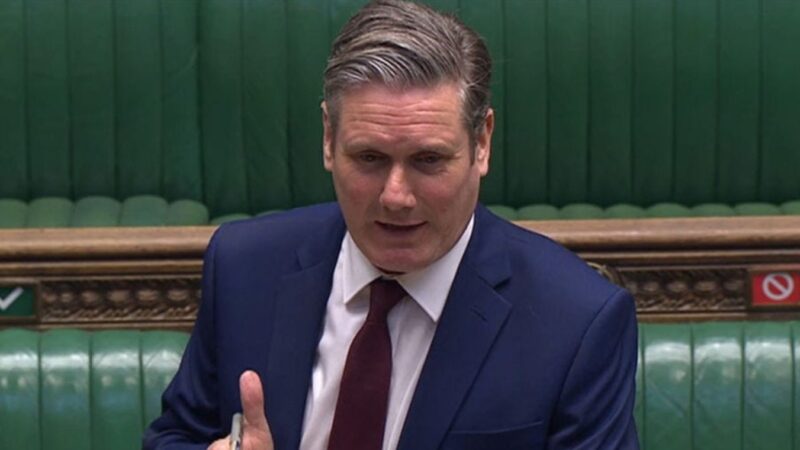Keir Starmer has promised to shift power from Westminster. Can his bold devolution promises realistically be delivered?

The front pages may be focused on chaos at the Channel Tunnel, but it is Scotland that was top of Keir Starmer’s agenda yesterday. In a highly trailed speech, Starmer pledged to “preserve and renew” the United Kingdom while offering a “positive alternative to the Scottish people.”
Using the carrot of a returning Gordon Brown, he promised to form a constitutional commission that will sit early next year to draw up plans to radically devolve “power, wealth and opportunity.” There was a lot of lofty talk, with Starmer calling it “the boldest project Labour has embarked on for a generation.”
However – with the best will in the world – it is difficult to see how Starmer’s ambitious promises are going to materialise.
Had it been delivered 15 years ago under a Labour government, then it could have been a game-changer. But at a time when Boris Johnson is Prime Minister, and the UK is days away from leaving the EU, possibly on disastrous terms, it is unlikely to have won many converts.
Is it deliverable?
The first problem is that Starmer is not in a position to deliver on any of it. The earliest he possibly could fulfil such pledges is 2024, when the next general election is held. It is unlikely that the Tories will commit to anything that comes from the commission, so if he is not elected then, its only purpose will be to expose the gulf between the potential of devolution and the reality of it.
Nothing could undermine the UK more than the sight of Starmer and Brown presenting a whole host of radical reforms only for them to be shot-down by Boris Johnson.
Even in the unlikely event that Starmer was to win in 2024 with a working majority, he would be taking office with a lot of competing demands. The kind of constitutional overhaul he is talking about would take time for any government to deliver, but, especially after 14 years of Tory rule, his inbox would be overflowing.
Even Scottish Labour’s own polling suggests that many Scots do not want to wait until 2024. A recent poll by Scottish Labour found that 58% of Scots want a fresh independence vote in the next four year.
Who will speak for England?
Starmer himself acknowledged that devolution is not just a question for Scots, it is for the whole of the UK.
In effect, the future of Scottish devolution is far more dependent on the views of the English and Welsh electorate than it is on Scots. Even if Scottish Labour somehow managed to win every single SNP-held seat in 2024, it would do nothing to impact on non-Tory numbers in the Commons.
The next Labour majority needs to be built in the ‘red wall’ of England. Needless to say, the English electorate is not particularly enthusiastic about the prospect of English devolution let alone Scottish independence, with a majority saying the break-up of the union would be a price worth paying to secure Brexit.
Is it too late?
There is a sense of Groundhog Day when it comes to Scottish Labour and devolution. In the run-up to the 2014 referendum, Gordon Brown famously promised a form of ‘home rule’ that was ‘near to federalism.’ This same promise has been reaffirmed repeatedly since, but, particularly if there is no ability to deliver – it is just words.
In recent months there has been speculation that Scottish Labour could support a future independence referendum if there was a third option on the ballot for more powers. There are circumstances under which this could make sense, but, if it has any chance of implementation then it would need the commitment of all of the pro-union parties.
Would a Tory-led government really be happy to allow it?
In any case, there is little reason to think that demand for independence can be offset by a dispassionate checklist of where each individual power should lie. Starmer is right to say that Scottish independence alone cannot solve inequality, injustice or poverty. It is doubtful that many expect it to, and there is no doubt that successive Tory government rule has exacerbated poverty and inequality.
Brexit underscores the limits of devolution
The Brexit vote and subsequent election of Boris Johnson have highlighted the limits of devolution. There is no version of devolution that can undo the damage of Brexit and maintain Scotland’s place in the EU, and none that can ensure Scots will no longer be bounced between periods of remote and unaccountable Tory governments.
Keir Starmer is still relatively unknown in Scotland, with almost half of Scots saying they have no firm opinion of him. Bearing that in mind, yesterday’s speech was less about promoting a vision and more about giving an introduction. However, first impressions count and, if the early signs are anything to go by, his approach is likely to pose as many questions as it does answers.
Andrew Smith is a Glasgow-based political campaigner. He works for a human rights organisation and tweets here.
To reach hundreds of thousands of new readers we need to grow our donor base substantially.
That's why in 2024, we are seeking to generate 150 additional regular donors to support Left Foot Forward's work.
We still need another 117 people to donate to hit the target. You can help. Donate today.



